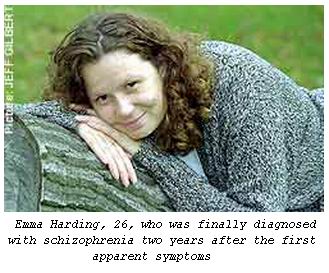
(Filed: 16/10/2001)
First, Emma Harding overcame schizophrenia. Now she wants to tackle our prejudice, she tells Christine Doyle
EMMA HARDING talks so enthusiastically about her career and plans for the future that you cannot imagine her trying to kill herself. But she almost succeeded when in the grip of acute paranoid schizophrenia.
爱玛-哈丁此时此刻如此热情洋溢地畅谈着她的工作和对未来的憧憬,你很难想象她曾极力想结束自己的生命。可是在她的偏执性精神分裂症病势笃剧的日子里,她几乎做成了这件事。
Now, with her life transformed, she helps people with mental health problems to find work, and lectures at health department workshops. Her aim is to break through the stereotypes. If only, Emma tells her audiences, those with the early signs of this illness were treated sooner, many more would not suffer as she did.
如今,随着自己的生活已完全改观,她正努力帮助精神健康出了问题的人找到工作,并在卫生机构的恳谈会上现身说法。她就是要打破人们在这一领域的陈旧观念。爱玛对她的听众说,如果那些表现出同样早期症状的精神疾病患者能够得到及时治疗,他们中的许多人就不会遭受她所经历的痛苦。
The first serious sign that all was not well with Emma emerged during her first year of a degree in social psychology. Her lecturers, she was convinced, were "hot wiring" her brain and conspiring to drive her mad. Her whispery, increasingly frequent "voices" also told her that fellow students were always talking about her.
爱玛最初显示事情有些不妙的征兆出现在她学习社会心理学学位的第一年。她确信她的讲师们在对她的大脑进行“电报轰炸”并图谋以此使她发疯。她内心中耳语般的、日渐频发的“声音”也不断提醒她身边的同学们时时在议论她。
Because of her textbooks, she knew about voices and strange behaviour. Even so, in her mind the "conspiracy" was genuine and one day she decided to tell her tutor of her suspicions. Within hours, he had arranged for her to see a psychiatrist. However, Emma included the psychiatrist in the imagined plot and did not tell him about her voices. Thinking perhaps that she was another stressed new student, he prescribed Prozac.
由于所学专业的性质,她对幻听和反常行为有所了解。但尽管这样,她在内心深处还是坚信这个“阴谋”是实实在在的,终于有一天,她决定去找她的指导教师诉说她的猜疑。指导教师很快安排她去看精神病医生。然而,爱玛认定精神病医生也是想象中的阴谋的参与者,拒不告诉他她所听到的声音。医生以为也许她只是一名精神过于紧张的新生,于是给她开了Prozac。
Spotting early signals of schizophrenia is confusing for parents, who also find themselves worrying about potential signs of depression, eating disorders or drug abuse. In Emma's case, there were, in retrospect, some early warning signs. She says she began to feel "socially awkward" during A-levels and that this became worse at university. She related her awkwardness to a break-up with her boyfriend, or perhaps to earlier experiments with drugs - "mostly cannabis, but some amphetamines and LSD".
精神病的早期症状常常令父母们感到迷惑不解,他们也意识到他们只是担心那些可能是情绪低落、饮食失调或是滥用毒品的信号。回顾爱玛这个病例,我们可以看到在早期确有一些值得注意的征兆。在准备高级考试期间,她回忆说她感到了“社交障碍”,后来到了大学情况更加恶化。她认为她的心理障碍与她同男友分手有关,或者可能是她早年尝试毒品的结果 – “主要是大麻,不过还有一些安非他明和LSD(麦角酸二乙基酰胺)。”
Her paranoia intensified. She recalled words from harmless conversations, cut them out of newspapers and strung them together to form the sentences of invective that she believed her friends really meant. During a particularly bad patch, she overdosed on a mixture of paracetamol and Prozac. For four days, she lay in her student room with the door locked, drifting in and out of consciousness. When, finally, she asked for a doctor, she was rushed to a liver unit and was lucky to survive.
她的偏执症状日益加剧。她一边复述听到的其实并无恶意的谈话内容,一边从报纸上挑出相同的单词剪下来,然后用它们摆出咒骂的字眼,而她认为这些是她的朋友们实际要说的意思。在病情最严重的时期,她曾大量服用扑热息痛和Prozac的混合制剂。随后,她接连四天躺在学生宿舍中,将门反锁着,时而昏迷,时而清醒。最后,她还是叫人找来医生,随即她被送往一家肝病专科医院。她很幸运,被抢救了过来。
Even at this stage, her severe condition remained undiagnosed; one doctor suggested depression. For a while, Emma felt "purged". She managed to focus on taking exams, but failed two of them. Although she was determined to resit the exams, "God" intervened. "One of my voices told me I was God and I believed it."
然而直至此时,她的病情还是未被正确诊断出来 – 一位医生认为是抑郁症。之后的一段时间里,爱玛觉得好象“灵魂得到净化”。她努力集中精力于考试上,可还是有两科未通过。虽然她决心补考,但“上帝妄想”又不期而至。“一个声音告诉我我是上帝,于是我相信了。”
This was an acute psychotic development. The possibility of a return to university faded as the delusions overwhelmed her. She began to believe that, as God, she had caused a plague in India. She told her increasingly worried father about this, and the voices. "I thought he would believe me, but Dad went very quiet."
这其实是病症急剧恶化的表现。随着她沉沦于这一妄想,返校复读的希望逐渐消失。她开始相信,作为上帝的她在印度掀起了一场瘟疫。她把这个妄想和那些声音说给她越来越担忧的父亲。“我以为他会相信我,可是爸爸听了只是沉默不语。”
Her father arranged for them to see their GP, but Emma again denied the voices. "The doctor said that unless I asked for help, he could not refer me." Another chance to treat her was lost, and over the following months the psychosis deepened.
父亲安排陪同她一起去看他们的普通医师,可是爱玛再次否认听到了什么声音。“那位医生说除非我要求主动求助,否则他不能把我转交给专科医生治疗。”她便这样又丧失了一次得到治疗的机会,在随后的数月里她的变态心理益发深重。
Finally, in desperation, her parents demanded a home visit from her GP. At last, just after Christmas 1994, Emma was admitted to a psychiatric hospital and schizophrenia was diagnosed, more than two years after the first apparent signs around the time of A-levels. Psychiatrists, such as Dr Adrianne Reveley, say Emma's story is typical and such delay is unacceptable. "We do not accept it with a physical illness; why should those with a mental illness have to suffer life-threatening symptoms?"
最终,她绝望的父母要求她的医师做一次家访。终于,1994年圣诞节一过,爱玛住进了一家精神科医院并被诊断为精神分裂症,这时距她最初在参加高级考试期间出现明显症状已有两年多时间。精神病专家们 - 比如艾德里安-瑞弗雷博士 - 说爱玛所经历的是精神分裂症患者典型的遭遇,类似这样的延误是不可接受的。“我们不允许生理疾病患者遭受这样的治疗延误,可是为什么精神病患者要无助地承受那些危及生命的症状呢?”
---to be continued

